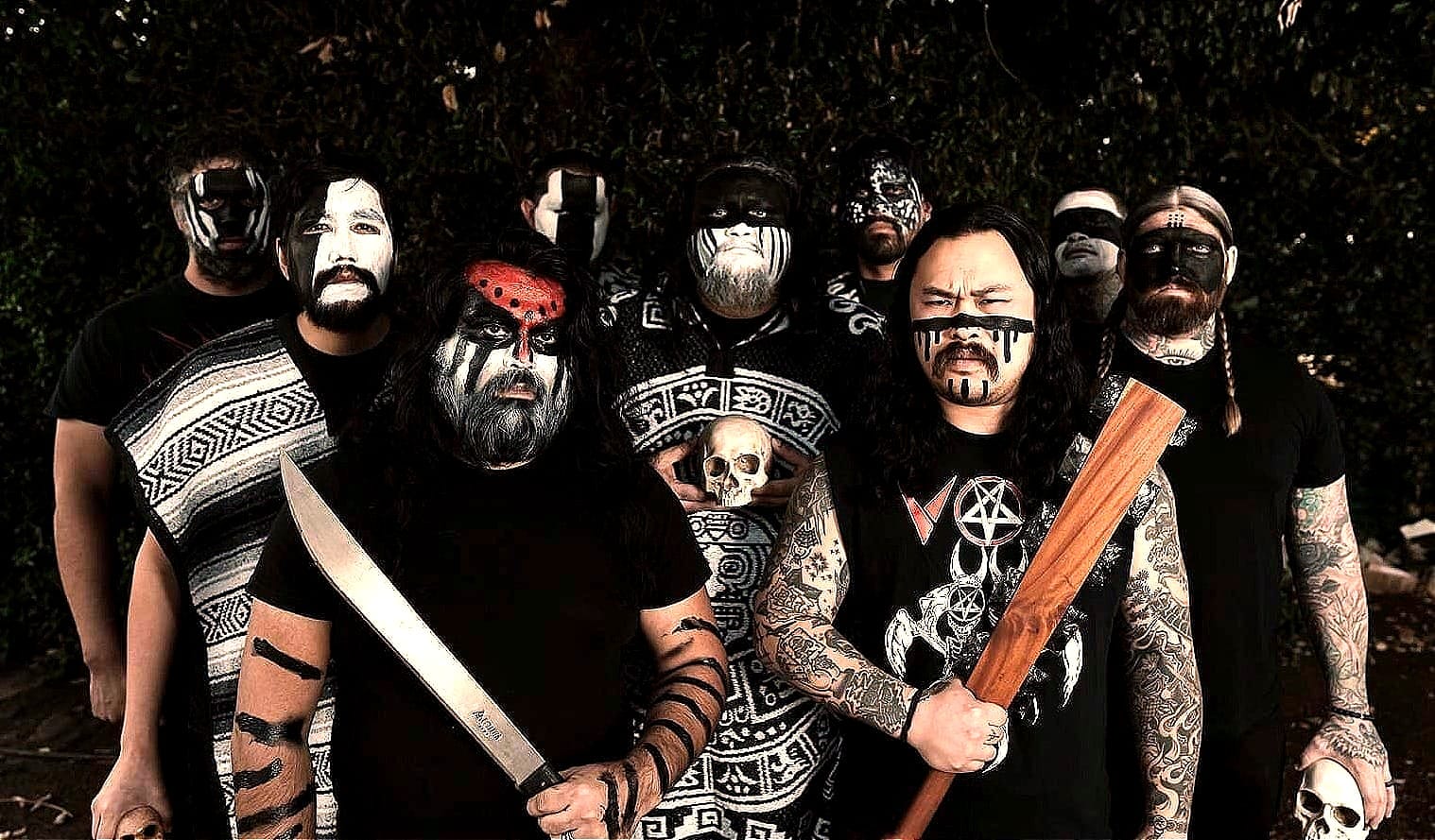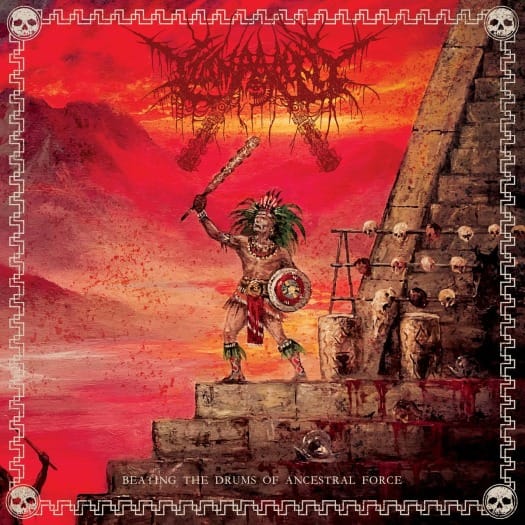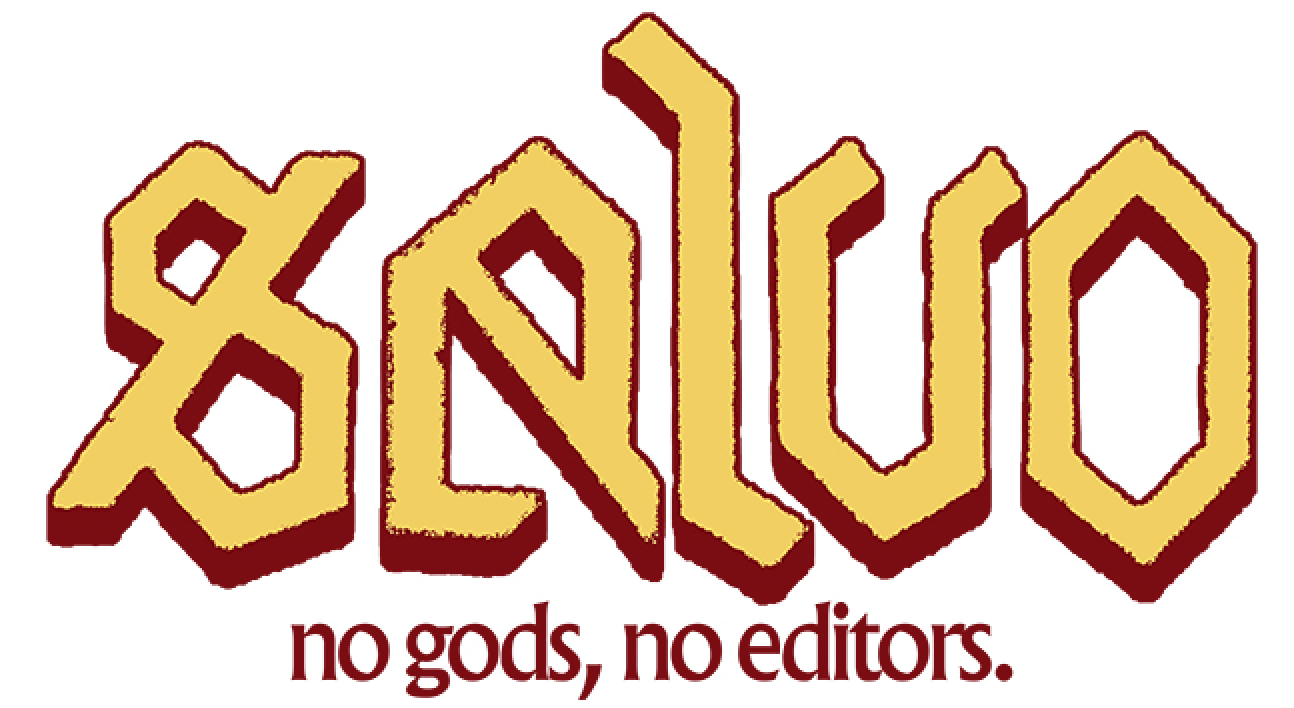Digging Into Tzompantli's Anti-Colonial Death/Doom
"I’m Indigenous, my ancestors are from this land, and this land belongs to us."

Folk metal has become a little bit of a dirty word thanks to the over-the-top goofiness of assorted pirates and Scandinavian trolls, but writing it off entirely is a great way to miss out on some extremely worthwhile musical projects. I'll spare you the deep dive into my long musical love affair with Ensiferum in order to point out that, despite its pasty mainstream image, folk metal—or, really, Indigenous metal—is actually one of the most diverse and intriguing subgenres in the metal pantheon.
From Corubo's odes of Indigenous Brazilian black metal resistance to Gyibaaw's ancestral Tsimshian/Gitksan war metal, Yaotl Mictlan's raw, atmospheric Mesoamerican (and EZLN) black metal, Blackbraid's melodic black metal rooted in the Adirondack Mountains, Nechochwen's Appalachian atmospheric metal, Iisnááhí's Diné desert black metal, and so many more, Indigenous metalheads are a creatively powerful force within the global scene.
For another recent example, take Tzompantli. The shit-hot California death/doom ensemble just dropped their latest album, Beating the Drums of Ancestral Force, on 20 Buck Spin, and it's one hell of a brutal, bloody offering. It is also a folk metal album, at least in the textbook sense: the band's ten (!) members use traditional folk instrumentation, their lyrics and concept revolve around pre-colonial Aztec, Mexica, and Chichimeca history, and the Indigenous Nahuatl language abounds on the album.
The project itself is the brainchild of Brian Ortiz, a.k.a. Obsidian Bear, a.k.a. Bigg o))), who some may recognize from his other anti-colonial metal of death project, Mortuary Punishment, or his role as the riffmaster general in SoCal death/hardcore heavyweights Xibalba. He stays busy, but it's obvious that Tzompantli holds a special place in his heart.
Ortiz handled everything himself on the first release, brought in a single contributor for the band's debut LP, Tlazcaltiliztli, and then expanded hard for round two, bringing in nine other musicians to help realize his apocalyptic vision. Tzompantli's most compelling aspect is the way he and his collaborators incorporate those pre-colonial elements (particularly the instruments) into their chosen medium of punishing death/doom metal. It all blends and flows beautifully together, and, crucially, is deftly woven into the compositions instead of feeling bolted-on.
"I wish I could articulate properly how I do it," Ortiz explains when I ask about his process. "I trust my intuition when inserting or laying the native instruments over the dense guitars, or sometimes I build around them. It just depends. I like to think that I am channeling my ancestors and letting them guide me."
If that truly is the case, they taught him well. I got the opportunity to have a quick chat with Ortiz right after the album dropped. Right around that same time, Stan from Salvo alums Terminal Nation declared that, "Brown man metal reigns supreme in May 2024!" (He wasn't wrong—that was a banger month that included Terminal Nation's 20 Buck Spin debut, too!). Our interview has been lightly condensed and edited for clarity.

SALVO: Thanks for taking the time to chat with me! The new album is an absolute force, and has been getting a ton of well-deserved attention. This is your second full-length with 20 Buck Spin, but a lot of listeners seem to be discovering you for the first time. Why do you think this record has hit so hard?
OBSIDIAN BEAR: Thank you! I think the first album definitely helped cultivate a solid fan base and brought us into people's periphery, but with this record, I think the artwork definitely helped lure more people in. My approach to this album wasn't too different then what I normally do. But with this album, I was more patient with the songs. I did a lot of pre-production at home and focused a lot on lyrics and vocal placements.
Can you tell me a bit about how the band came together? 10 people, multiple guitarists, a variety of traditional instruments, four vocalists... How and why did all of these specific people come together for this specific project? Did some of you have to learn how to play these traditional instruments for Tzompantli?
The vision and the concept of the band is all me; however, when we started playing shows, I just got close homies that I trusted to play the songs right and who I felt believed or honored my vision. After playing a few shows with a relatively steady line up, I wanted to include them more on the new record. None of them had to learn anything too complicated on the record since I do a majority of the folk instruments. The members that perform the percussive side already have the chops to perform, too, so there wasn't much I had to show them.
I'd love to hear more about the instruments themselves. Which instruments did you use exactly, and how did you learn to play them?
I learn to play them by watching others and teaching myself. I have been playing drums off and on since I was 16 years old and watching the Danzantes [Aztec Dancers] since I was a kid, so I had a general idea about the rhythms and rudiments while adding my style on it.
The instruments we used on the record (starting with percussion) were huehuetls (which is big Mexica drums), teponatzli (a hollowed-out piece of wood drum), and to fill them out we used a lot of congas, as well as floor and rack toms. I used a lot of the bead and shell shakers, a few different Mexica death whistles, and a few different animal flutes.
The lyrics of Beating the Drums of Ancestral Force seem to follow a specific historical arc; it's a tale of violent invasion, colonization, and the downfall of a mighty civilization. Can you tell me more about which specific historical events inspired you here? Is it a straightforward reference to Cortes' assault on the Aztec Empire, or more of a broader commentary on the Spanish invasion?
The first two songs on the album are in reference to the Spanish invasion. The first song, "Tetzahuitl," is about the premonitions that Emperor Moctezuma and some of the priests were having for months foretelling the Spanish arrived. The second song, "Tlayohualli," is about "La Noche Trista" (Night of Sorrows), where the Mexica drove the Spanish and their Indigenous allies out of Tenochtitlan.
But the middle and end of the song is describing how the Mexica warriors felt afterwards. They didn't feel triumphant, but confused and weak, as most of them became ill from sicknesses and diseases to which they had no tolerance or immunity. On the song "Chichimecatl," it is describing the Chichimecas fighting off the Spanish. This group of different nomadic tribes were never conquered or defeated by the Spanish or their allies.
On a similar note, I really appreciate Tzompantli's commitment to identifying as an Indigenous metal band. The idea of Indigeneity has been so warped by the U.S. colonial project that the enormous scope of indigenous communities is too often obscured or denied. Actual natives of this continent are consistently treated as "immigrants," meanwhile, their civilizations have been here since time immemorial and the families of the white politicians making these decisions had to cross an entire ocean to set foot here. I was wondering if you'd be down to speak to this in the context of your own experiences and work with Tzompantli?
Of course. I think with a lot of Southern Indigenous peoples (Mexico, Central and South America), we have been so assimilated that we don't even think to acknowledge our Indigeneity and just accept these Eurocentric labels like "Hispanic" and "Latino" to describe us. I have been slowly reconnecting with my roots for the past 20 years, but with Tzompantli, it caused me to dig deeper. It helped educate me, and embolden me to explicitly say I’m Indigenous, my ancestors are from this land, and this land belongs to us.
How did you first learn about these aspects of your culture? Did you grow up speaking Nahuatl or come to it later? How much of this history have you had to seek out on your own?
There was a lot of cultural stuff that has been in our families for a long time. But as I got older, I wanted to know where those traditions came from, so I would ask older relatives here in the states as well as relatives that are still in Mexico. Luckily, I grew up here in Los Angeles, where there is a large Mexican/Chicano population, so I also grew up seeing the Mexica and Chichimec Danzante groups doing ceremonies. I even learned that a lot of the Catholic traditions that we were raised in were originally indigenous ones. All of that taught me about being proud of who I am and where I come from.
I didn't grow up speaking Nahuatl, but Mexican Spanish is unique because there are a lot of Nahuatl words that became a part of Mexican Spanish. But I would say I have been slowly learning the language over the last 8 years or so. I can't hold a conversation in Nahuatl, but when I see words and sentences I can get an idea of what is being said.
Relatedly, what has it been like for you personally to explore these very explicit connections in the context of an extreme metal band? What do non-metal people in your family and community think of the project?
It feels great! I feel more connected to my roots more than ever, especially on a deeper, more spiritual level. My non-metalhead family love what I do, they think it is so cool and have always been so supportive of my music. It's gotten to the point where my tias will ask me questions about our peoples and histories, which is pretty sick. I feel like a wise ass man now.
What are your plans and ambitions for Tzompantli going forward? I imagine it must be difficult to coordinate scheduling with a 10-person band, but would kill to be able to see y'all perform this material live!
Haha, you have no idea! But for real, we do plan on playing a little more just based on everyone’s reactions and support. Hopefully set up a release gig over the summer. Also, I hope that one day there’s enough of a demand to play more all over the world but for now I’m happy just writing and chillin.
Are there any other Indigenous metal bands you feel a kinship with or would like to shout out?
There are a bunch! Just a few off the top of my head: Yaotl Mictlan, Ixachitlan, Maleficent, Blackbraid, Ysyry Mollun, Pan-Amerikan Native Front, Periodeater, Homeland, End's Embrace, Lionoka, and many more!
Is there anything else you'd like to add?
Thank you for being interested in Tzompantli enough to wanna talk to us. We appreciate the support! Tlazocamati.
+
'Beating the Drums of Ancestral Force' is out now on 20 Buck Spin. Stream it here, kill the colonizer in your head, grab some merch, and tell yer friends about Salvo.

